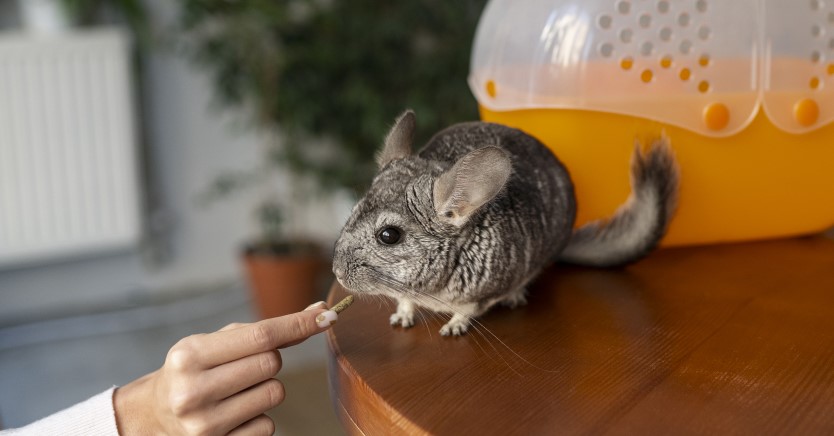Ask Dr. Jenn: Do Chinchillas Make Good Pets?
My daughter watches TikTok videos of chinchillas holding signs and dressing up. Now she wants a chinchilla. What can you tell me about them? Do they make good pets?

Chinchillas are adorable! Their little front paws are prehensile so they can hold things, such as food, toys, and the little signs you see on TikTok. They hop like a bunny and have big round ears like a mouse.
Chinchillas make wonderful pets, but they are not for everyone. The lifespan in captivity is 8-20 years so be prepared for a long-term commitment. Although smaller than a guinea pig, they require much more space. A large, multilevel enclosure is recommended to satisfy their instinct to jump from one ledge to another. They need lots of exercise and should be let out of their cages to run around. However, they need to be supervised, as they like to chew on everything, including carpet, electrical cords, and pieces of plastic.
They are nocturnal, meaning they are much more active during the night and sleep during the day. This is not a pet you want to keep in your bedroom, especially if you are a light sleeper.
The chinchilla has the densest coat of all land animals, with approximately 50 hairs per follicle. In comparison, humans only have one hair per follicle. To keep their fur from matting, chinchillas roll in dust a few times a week. The dust removes excess oil from their fur and keeps it light and fluffy. However, the dust is also very fine and creates a little cloud in the air. Dust particles settle throughout the room and may aggravate allergies.
In the wild, the fur also acts as a defense mechanism. If caught or bit by a predator, they will release clumps of fur, a phenomenon known as fur slip. If your chinchilla is handled roughly, he will likely lose some fur and be left with a bald patch.
It is important to socialize your chinchilla and get him used to being handled. This is best done at a young age. If he is handled and played with as early as six weeks old, he will be your best friend. But if he has little contact with people until he is older, he is more likely to be stand-offish and bite, also making him more susceptible to fur slip.
Chinchillas cannot be housebroken. They will drop little pellets as they hop. The good news is these pellets should be hard and vacuum up easily. You will already be vacuuming frequently thanks to the regular dust baths. Some chinchillas will learn to hold their urine until they are in the kennel, giving you one less mess to clean up.
In the wild, chinchillas are found in South America, high in the Andes mountains. The climate is cold and dry. Their dense haircoat makes them very sensitive to heat and humidity and puts them at risk for heat stroke. The cage should be kept away from direct sunlight and chinchillas are best not kept in humid environments.
Chinchillas should have access to fresh water and hay at all times. Look for grass hay that is lower in calcium, such as Timothy hay, orchard grass, oat hay, or meadow hay. Alfalfa hay has too much calcium and can lead to urinary crystals. Pellets should also be a major part of the diet. Purchase a high quality, chinchilla-specific diet to ensure it is well balanced and has the correct amounts of protein, fat, and roughage necessary to keep your chinchilla healthy. Chinchillas love treats and they look adorable as they hold the treat in their little paws. However, treats should be used sparingly as chinchillas can be prone to obesity. Dried foods, such as dehydrated carrots, raisins, or dried rose hips are better than water-dense foods. Chinchillas have adapted to a low moisture diet in the wild and foods higher in water can lead to soft stool and GI upset.
This is just a sample of the information you need to know to properly care for a chinchilla. Please make sure you do more research and make sure you have the right environment for this unique animal.
Ready to start saving money on pet wellness care?
Then take a look at Mint Wellness, the pet wellness plan that provides fast reimbursement on routine pet care. Save on vaccinations, wellness exams, preventatives, dental, and more!
Learn More